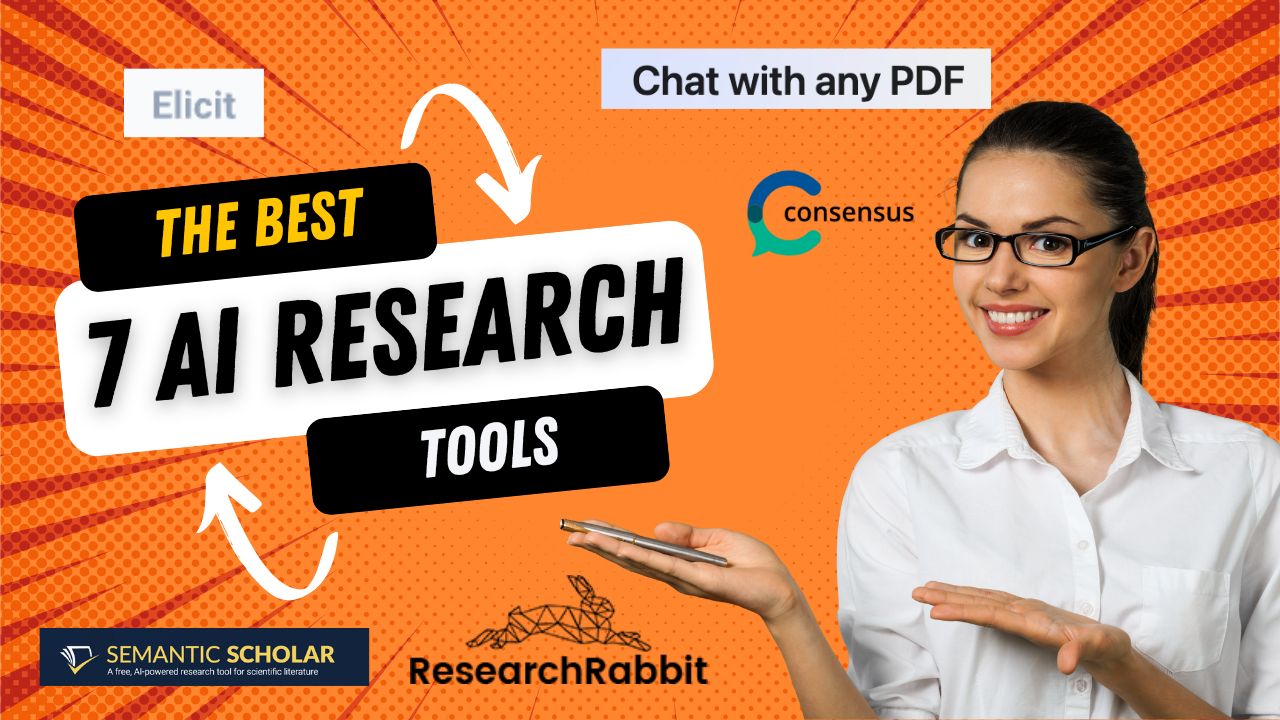Discover The Best Research AI Tools for Your Research
Imagine a world where research is no longer a daunting task, but an enjoyable and efficient process. Thanks to incredible advances in AI technology, this dream is now a reality. As a student in research, I know how hard it can be to find, organise and summarise studies, research papers, case studies and findings. Luckily, it’s the age of AI and I’ve been able to experience several tools for students and researchers. Here are the top 7 AI research tools and AI research solutions that will revolutionise your research experience. Each tool is aimed at different areas of research and science, so there’s something for everyone. So let’s dive in and explore how these cutting-edge AI tools can improve your research journey.
Best AI Tools For Researchers
Some AI tools for researchers include:
- Research Rabbit: A literature review mapping tool that uses AI to recommend related articles and create a visualization map of the articles it finds.
- Poe: A bot tool that gives users access to popular chatbots and allows them to create their own.
- PromptHero: A searchable index of prompts that helps users find the right words to get the best results from AI programs like ChatGPT.
- Scispace: A tool that uses AI to help researchers understand research papers. It can explain and elaborate on academic texts in simple words.
- Jenni: An AI-powered writing assistant that can help with writing, citing, and editing research. It’s designed for academic writing, such as research papers and academic pieces of content. Jenni AI can also be used to write blog posts.
- Consensus: An AI-powered search engine that assists you in discovering and comprehending the scientific consensus on a particular subject. It is designed to provide you with a comprehensive understanding of the current state of research on any given topic.
- Elicit.org: A website that offers an AI-powered research assistant that can help automate research tasks like literature reviews, paper summarization, and key information extraction.
- Scite.ai: Award-winning platform that leverages AI to help you discover and evaluate scientific articles through smart citations.
- ChatPDF: An AI tool that lets users interact with any PDF. You can have a conversation with books, essays, research papers, manuals, and legal contracts. The maximum file size for uploading a PDF is 30 MB.
- Semantic Scholar: An AI-driven search engine that helps researchers find relevant articles and resources quickly.
- ZAIA AI Assistant: AI assistant from Zendy that is intended for research. New features include PDF analysis, conversation history, and reference validation.
- Tableau: Tableau is a data visualization tool that helps users create reports, dashboards, and stories for analyzing data.
- Mendeley: Mendeley is a reference management software that helps researchers organize sources, collaborate with colleagues, and discover new research.
Best AI Research Tools:
- Research Rabbit – Reimagining Research for Researchers with AI.
- Elicit – Predicting Experimental Outcomes with AI for Research.
- Scite – Smart Citations for Better Research with Research AI.
- ChatPDF – Chat with any PDF using AI for Research.
- Consensus – Collective Decision-Making with AI-Powered Research Summaries.
- Semantic Scholar – AI-driven Literature Search with Research AI.
- Iris.ai – Your AI-Powered Research Assistant for AI for Research.
?Which is The Best AI Research Tool for Your Research Profession and Field?
- Social Sciences
- Arts, Humanities, and Business
- Health and Medicine
- Engineering and Technology
- Natural Sciences
- Independent Researcher
- Student (Bachelor, Master)
- Employee in Research and Development (R&D)
- Principal Investigator
- Postdoctoral Researcher
- PhD Student
- Journalist
- Data Scientist
If the links don’t work, please scroll down.
✅Sign up to be notified when a new blogpost is published featuring AI Tools here
What is a research tool?
A research tool is any device, technology, procedure, biological material, reagent, computer system, computer software, or analytical technique that assists in the discovery, development, or production of a project or product. The characteristics of good research tools include being valid, reliable, and user-friendly.
What is a research AI tool?
A research AI tool refers to a website, application, or search engine that utilizes artificial intelligence (AI) for research purposes. These AI tools offer various benefits to researchers such as summarizing information, providing annotations, and generating citations. They can be valuable resources for conducting efficient and effective research activities.
Here are some examples of AI tools commonly used in research:
- Summarization tools: These tools use algorithms to condense lengthy texts into shorter summaries while retaining the key information.
- Annotation tools: With these tools, researchers can add notes, highlights, or comments to digital documents for better organization and understanding.
- Citation management tools: These tools assist in generating accurate citations in different citation styles (e.g., APA, MLA) by automatically extracting relevant details from sources.
- Plagiarism checkers: By comparing submitted work against a vast database of existing content, plagiarism checkers help identify any potential instances of plagiarism.
- Data visualization tools: These tools enable researchers to create visual representations (e.g., charts, graphs) of their data for easier interpretation and presentation.
1. Research Rabbit – Reimagining Research for Researchers with AI
Research Rabbit is an AI-powered platform that aims to empower researchers at every step of their journey. Starting with the Discovery app, it helps you search for papers, authors, monitor new literature, visualize research landscapes, and collaborate with colleagues. With a mission to connect you to funding, employment, and other opportunities, Research Rabbit is perfect for researchers in any field who are seeking a holistic research experience and organize their research.
✅Pros:
- Comprehensive approach: Addresses every step of the research process, from discovery to collaboration and opportunities.
- Focus on community: Dedicated to supporting researchers and fostering connections within academia.
- Personalized experience: Tailors its features to your needs, making it easier to find relevant opportunities and resources.
⛔Cons:
- Early stage: As a newly launched platform, some features are still under development, and it may take time to reach its full potential.
- Limited reach: The opportunities available on the platform might not cover all research fields, making it less beneficial for some researchers.
Review: Research Rabbit is an innovative platform designed to empower researchers by connecting them with various opportunities. Its Discovery app offers a unique approach to searching for papers, authors, and tracking new literature. While it’s still in its early stages, the potential for this platform to transform the way researchers find funding, jobs, and collaborations is promising. However, it might take some time to reach its full potential, and the opportunities available may not cover all research fields. The Discovery app is currently free to use. However, additional features and services might be available in the future for a fee.
2. Elicit – Predicting Experimental Outcomes with AI for Research
Elicit is an AI tool that predicts experimental outcomes using machine learning algorithms. By analyzing your experimental design and predicting results, Elicit helps you refine your approach and optimize your research. Ideal for researchers in the life sciences, Elicit is a game-changer that can save you time and resources by reducing trial and error.
✅Pros:
- Predictive power: Uses machine learning algorithms to predict experimental outcomes, optimizing your research process.
- Resource efficiency: Reduces trial and error, saving time and resources for researchers.
- Targeted expertise: Ideal for life sciences researchers, providing specialized support for experimental design and optimization.
⛔Cons:
- Niche focus: Primarily targeted at life sciences, which means researchers in other disciplines may not find it as useful.
- Dependence on data: The quality of predictions relies on the data provided, making it less accurate if the input data is limited or incomplete.
Review: Elicit is a powerful AI-driven tool focused on life sciences. It helps predict biological effects of molecules and can be instrumental in drug discovery and other related fields. The tool’s predictions are based on the provided data, and its accuracy increases as more data is available. However, researchers in other disciplines may not find it as useful, and the quality of predictions depends on the data provided. The website does not provide explicit information about the pricing, but it is recommended to contact them for more information on access and pricing.
3. Scite – Smart Citations for Better Research with Research AI
Scite is an award-winning platform that leverages AI to help you discover and evaluate scientific articles through smart citations. These citations provide context and classification, enabling you to quickly identify supporting or contrasting evidence. Scite is perfect for researchers across various disciplines who want to save time evaluating research and finding relevant literature.
✅Pros:
- Smart citations: Provides context and classification to help you quickly identify supporting or contradicting evidence.
- Time-saving: Speeds up literature evaluation and discovery, giving you more time for critical analysis. Broad applicability: Useful for researchers in various disciplines, making it a versatile tool for literature reviews and analysis.
⛔Cons:
- Incomplete coverage: Though it analyzes a large number of articles, it may not cover all publications in every field, leading to potential gaps in citation information.
- Requires manual analysis: While scite provides context for citations, researchers still need to analyze and interpret the information to draw their conclusions.
Review: Scite is an award-winning platform that revolutionizes the way researchers discover and evaluate scientific articles through Smart Citations. It provides valuable context and classification of citations, making it easier to find relevant and well-supported results. While it covers a vast number of articles, there might be gaps in citation information, and researchers still need to analyze and interpret the provided information. Scite offers both free and paid plans. The free plan allows limited access to features, while the paid plans provide more comprehensive access.
4. ChatPDF – Chat with any PDF using AI for Research
ChatPDF is a powerful AI tool that enables you to interact with PDF documents effortlessly. Whether you’re a student, a working professional, or a curious mind, ChatPDF can help you comprehend textbooks, research papers, financial reports, legal contracts, and more. With support for multiple languages, ChatPDF makes it easy to access and understand information from any PDF.
✅Pros:
- User-friendly interaction: Allows you to chat with PDF documents, making information extraction simple and intuitive.
- Multi-purpose: Suitable for students, professionals, and curious minds, with applications for academic growth and workplace efficiency.
- Language versatility: Supports multiple languages, enabling you to access and understand information from any PDF, regardless of the language.
⛔Cons:
- PDF dependency: Works exclusively with PDF documents, which means it cannot extract information from other document formats.
- Limited complexity: While it can answer questions from any PDF, it might struggle with highly complex or nuanced queries.
- Images and illustrations: While ChatPDF can parse text in PDFs very well, it cannot read images or illustrations in PDFs.
Review: ChatPDF is a unique tool that allows users to ask questions and get answers from any PDF document. Ideal for students, professionals, and curious minds, this tool makes understanding complex documents a breeze. However, it works exclusively with PDFs and might struggle with highly complex or nuanced queries. ChatPDF is free to use, but it may have limitations in terms of the number of documents you can process or the complexity of questions you can ask.
5. Consensus – Collective Decision-Making with AI-Powered Research Summaries
Consensus is an AI-driven search engine that helps you find and understand the scientific consensus on a given topic. By leveraging GPT-4-powered scientific summaries and the Consensus Meter, it enables users to quickly assess the landscape of evidence and make informed decisions. Ideal for team-based researchers or those seeking a quick overview of scientific evidence, Consensus simplifies the research process and promotes evidence-based decision-making.
✅Pros:
- AI-powered summaries: GPT-4-powered scientific summaries help users understand research findings quickly and easily.
- Consensus Meter: Provides an overview of the evidence landscape, enabling users to assess the level of agreement among different sources.
- Time-saving: Speeds up the research process, allowing users to focus on critical analysis and informed decision-making.
- Combination with Semantic Scholar: With Consensus you can download research papers using semantic scholar.
⛔Cons:
- Limited scope: May not cover all research fields or provide a comprehensive analysis for complex or niche topics.
- Dependence on data: The quality and accuracy of the summaries and Consensus Meter depend on the data available, which may be limited or incomplete.
Review: Consensus is a valuable tool for researchers seeking a quick and efficient way to understand scientific evidence and make collective decisions. Its AI-powered summaries and Consensus Meter enable users to assess the landscape of evidence and identify areas of agreement or disagreement among sources. However, its scope may be limited for certain research fields or complex topics, and the quality of the summaries and Consensus Meter depends on the available data. Pricing information for Consensus is not explicitly mentioned, and it is recommended to contact them for more information on access and pricing.
6. Semantic Scholar – AI-driven Literature Search with Research AI
Semantic Scholar is an AI-driven search engine that helps researchers find relevant articles and resources quickly. By understanding the content and context of scientific papers, Semantic Scholar delivers personalized search results, making it a valuable tool for researchers in any field who want to speed up their literature search process.
✅Pros:
- AI-driven search: Delivers personalized search results by understanding the content and context of scientific papers.
- Time-efficient: Speeds up the literature search process, helping you find relevant articles and resources faster.
- Broad reach: Suitable for researchers in any field, making it a versatile tool for discovering new and relevant literature.
⛔Cons:
- Index limitations: Although it has a vast database, it may not index all articles from every publisher, leading to potential gaps in search results.
- Academic focus: Semantic Scholar may not be as useful for non-academic researchers who need information from non-scholarly sources.
Review: Semantic Scholar is a powerful AI-driven research tool that helps users find and understand academic papers. Its vast database and user-friendly interface make it a go-to platform for researchers. However, it may not index all articles from every publisher, and non-academic researchers might find it less useful for non-scholarly sources. Semantic Scholar is free to use and provides access to a vast database of academic papers and research articles.
7. Iris.ai – Your AI-Powered Research Assistant for AI for Research
Iris.ai is an innovative AI-powered research assistant that streamlines your literature review process. With a simple keyword search, Iris.ai generates a comprehensive mind map of relevant research articles, offering a birds-eye view of your research landscape. Ideal for researchers in STEM fields, Iris.ai helps you identify connections between studies, discover new research areas, and ensure you don’t miss any critical information.
✅Pros:
- Visual representation: Generates comprehensive mind maps of relevant research articles, providing a clear overview of your research landscape.
- Connection discovery: Helps you identify connections between studies and discover new research areas.
- Thorough literature review: Ensures you don’t miss any critical information, making your literature review process more efficient and comprehensive.
⛔Cons:
- Learning curve: The visual representation and mapping process may require some time to learn and understand for new users.
- Subscription-based: Advanced features are available only with a subscription, which might be a drawback for users with budget constraints.
Review: Iris.ai is an AI-powered research assistant that helps users navigate the research landscape through visual mapping. It streamlines the literature review process and helps identify relevant papers quickly. The visual representation may require some time to learn for new users, and advanced features are available only with a subscription, which could be a drawback for those with budget constraints. Iris.ai offers a free version called Iris.ai Lite with basic features. For more advanced features, users can subscribe to their paid plans.
https://poll.fm/12180194
Conclusion: Which is the best AI Research Tool for Your Field
In conclusion, the best AI research tool for your field depends on your specific needs and discipline. Researchers seeking a comprehensive and holistic research experience across various fields can benefit from Research Rabbit. Life sciences researchers can optimize their experimental design with Elicit, while Scite is perfect for researchers across disciplines who want to save time evaluating research and finding relevant literature. ChatPDF is ideal for students and professionals who need to extract information from PDF documents, while Consensus is best suited for team-based researchers looking to make collective decisions. Semantic Scholar serves as a versatile literature search tool for researchers in any field, and Iris.ai is perfect for STEM researchers who want a visual overview of their research landscape. Explore these cutting-edge AI tools and revolutionize your research journey today!
✅Sign up to be notified when a new blogpost is published featuring AI Tools here
AI research tools for the following research areas and research professions:
- Social Science Researchers
- Art, Humanities, and Business Researchers
- Health and Medicine
- Engineering and Technology
- Natural Sciences
- Independent Researcher
- Student (Bachelor, Master)
- Employee in Research and Development (R&D)
- Principal Investigator
- Postdoctoral Researcher
- PhD Student
- Journalist
- Data Scientist
For the various research fields, I recommend the following AI research tools:
Social Sciences:
- Research Rabbit: A comprehensive research platform for researchers in various fields.
- Scite: An AI-powered platform for smart citations, helpful for literature reviews.
- Semantic Scholar: An AI-driven search engine for academic articles, suitable for researchers in various disciplines.
Arts, Humanities, and Business:
- Research Rabbit: A comprehensive research platform covering the entire research process.
- Scite: An AI-powered platform for smart citations, helpful for literature reviews.
- ChatPDF: An AI tool for extracting information from PDF documents, ideal for students and professionals.
Health and Medicine:
- Elicit: An AI tool for predicting experimental outcomes, ideal for researchers in life sciences.
- Scite: An AI-powered platform for smart citations, useful for researchers in various disciplines.
- Semantic Scholar: An AI-driven search engine for academic articles, suitable for researchers in various disciplines.
Engineering and Technology:
- Research Rabbit: A comprehensive research platform for researchers in various fields.
- Semantic Scholar: An AI-driven search engine for academic articles, suitable for researchers in various disciplines.
- Iris.ai: An AI-powered research assistant that creates visual overviews of the research landscape, ideal for STEM researchers.
Natural Sciences:
- Research Rabbit: A comprehensive research platform for researchers in various fields.
- Elicit: An AI tool for predicting experimental outcomes, ideal for researchers in life sciences.
- Semantic Scholar: An AI-driven search engine for academic articles, suitable for researchers in various disciplines.
- Iris.ai: An AI-powered research assistant that creates visual overviews of the research landscape, ideal for STEM researchers.
The following tools can be used across various fields, providing valuable assistance to researchers regardless of their discipline:
- Research Rabbit: A comprehensive research platform that covers the entire research process, empowering researchers in various fields with tools for discovery, collaboration, and connecting with opportunities.
- Scite: An AI-powered platform for smart citations, useful for researchers across disciplines who want to save time evaluating research and finding relevant literature. It provides context and classification for citations, making it easier to discover supporting or contradicting evidence.
- Semantic Scholar: An AI-driven search engine for academic articles, suitable for researchers in various disciplines. By understanding the content and context of scientific papers, it delivers personalized search results, making it a versatile tool for discovering new and relevant literature.
For the various professional research roles, I recommend the following AI research tools:
Independent Researcher:
- Research Rabbit: A comprehensive research platform covering the entire research process.
- Scite: An AI-powered platform for smart citations, helpful for literature reviews.
- Semantic Scholar: An AI-driven search engine for academic articles, suitable for researchers in various disciplines.
Student (Bachelor, Master):
- Research Rabbit: A comprehensive research platform for researchers in various fields.
- Scite: An AI-powered platform for smart citations, helpful for literature reviews.
- ChatPDF: An AI tool for extracting information from PDF documents, ideal for students and professionals.
Employee in Research and Development (R&D):
- Research Rabbit: A comprehensive research platform for researchers in various fields.
- Elicit: An AI tool for predicting experimental outcomes, ideal for researchers in life sciences.
- Semantic Scholar: An AI-driven search engine for academic articles, suitable for researchers in various disciplines.
Principal Investigator:
- Research Rabbit: A comprehensive research platform for researchers in various fields.
- Semantic Scholar: An AI-driven search engine for academic articles, suitable for researchers in various disciplines.
Postdoctoral Researcher:
- Research Rabbit: A comprehensive research platform for researchers in various fields.
- Scite: An AI-powered platform for smart citations, helpful for literature reviews.
- Semantic Scholar: An AI-driven search engine for academic articles, suitable for researchers in various disciplines.
PhD Student:
- Research Rabbit: A comprehensive research platform for researchers in various fields.
- Scite: An AI-powered platform for smart citations, helpful for literature reviews.
- Iris.ai: An AI-powered research assistant that creates visual overviews of the research landscape, ideal for STEM researchers.
Journalist and Data Scientist:
Since the 7 tools provided are primarily focused on academic research, they may not be directly applicable to journalists and data scientists. However, some of these tools can still be helpful for finding relevant information and literature:
- Research Rabbit: A comprehensive research platform for researchers in various fields.
- Semantic Scholar: An AI-driven search engine for academic articles, suitable for finding reliable information.
_________________________________________________________________________________________
✅Sign up to be notified when a new blogpost is published featuring AI Tools here.
Missed a Blogpost?
- Blog 1: AI for Research: Unlock the Full Potential of ChatGPT-4
- Blog 2: Best 7 AI Chrome Extensions for Research in 2023
- Blog 3: Attention Researchers and Students: Will AI Replace Your Job? Here’s What You Need to Know
- Blog 4: Top 5 Websites and Platforms Using AI for Research
- Blog 5: The Best 7 Research AI Tools You Can Use for Your Research Field in 2023
- Blog 6: Browse AI – Better than Google: Research Anything with 5 Browse AI Tools in 2023 [demo videos]
- Blog 7: Best 17 Research AI Tools for Your Research Paper in 2023
- Blog 8: Best 7 Research AI Tools For Researchers and Students To Accelerate Research In 2023 [demo videos]
- Blog 9: Glossary of AI Tools for Research
If you would like to read more reviews about AI Tools, please click here.











Absolutely awesome this post!!
Loved the reviews, very clear. And will definitely make my life as a student easier hahaha
Thank you for bringing so much nice content to us.
Dear Samira 🙂
Thank you so much for all your lovely comments! It’s really very gratifying to hear that my tips and tools are helpfull for you.